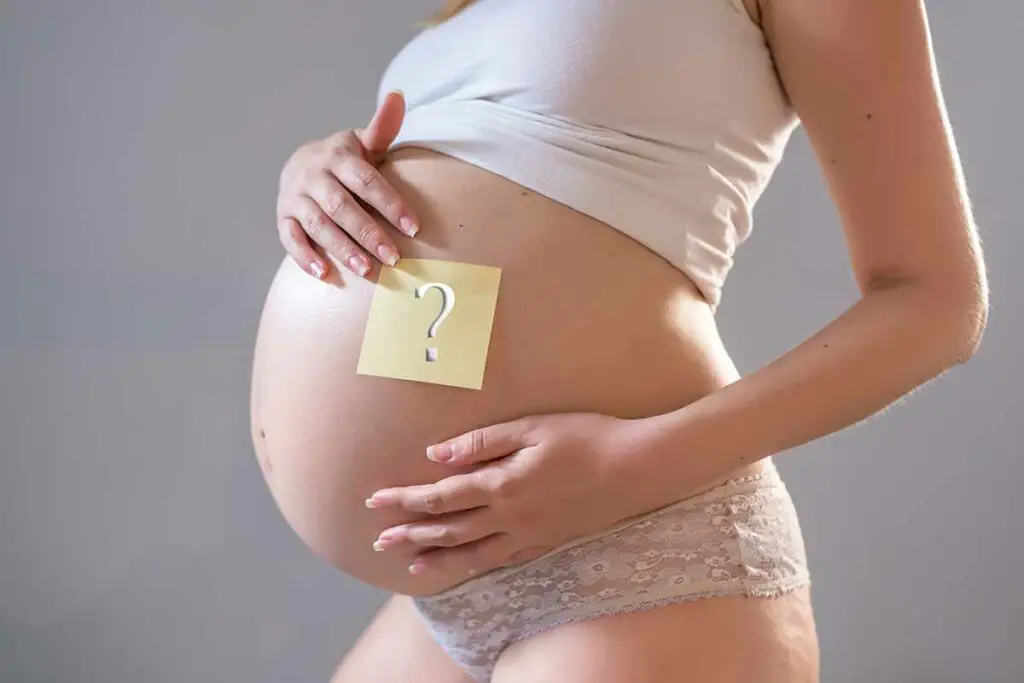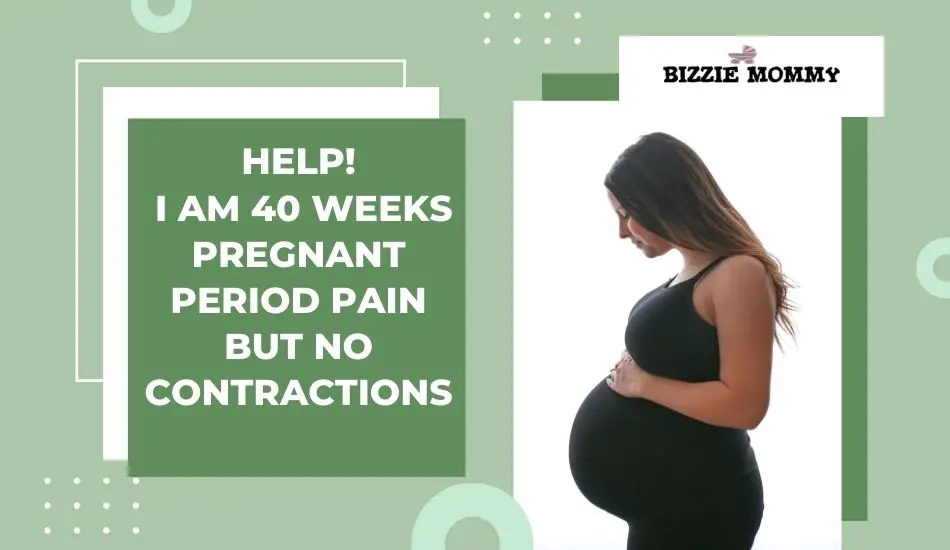Being pregnant for the first time affects your nerves in the worst possible way. You may feel like jumping to your feet every time you feel a little pain in your belly. Do you wonder whether your contractions have already started? Worry not because your contractions will come at the right time.
Point to be noted: Having contractions at 40 weeks of pregnancy is completely normal, so there is no reason to panic. It feels like period pain at first, and then the pain becomes more intense in your lower abdomen as you start dilating. So my friend, if you feel period pains at 40 weeks of pregnancy, that’s your signal towards your very first contractions.
What Is The Difference Between True And False Contractions?
It is hard to tell true from false contractions. False contractions can be quite convincing. While most women don’t even feel them, false or Braxton hicks contractions affect women in the same way as real contractions.
An actual contraction is more like the tightening and relaxing action of your uterus muscles. You will feel them not only in your lower abdomen but on the front and backside too. They occur in regular intervals, unlike irregular Braxton Hicks contractions. This is how you can tell them apart. The frequency of real contractions will increase after shorter intervals, and they become more intense with every passing moment.
How To Tell It Is A Braxton Hick’s Contraction?
Braxton Hicks contractions are very much like regular contractions, but you can tell them apart from real contractions. Braxton Hicks are not as strong as real contractions. They are like a twinge in your lower abdominal area. That’s why they are convincing, especially to first-time moms.
Most moms feel a slight tightening of their tummy during Braxton Hicks contractions. They are less intense than real contractions, so you can also call them practice contractions. Typically this is the case. However, some moms complain that the pain is like hardening and softening of the belly. It varies from pregnancy to pregnancy, but most women don’t even feel Braxton Hicks contractions.
However, they are nothing to be worried about. If you are feeling a lot of pressure on your tummy or the cramping stops, you must contact your doctor. But in most cases, if the baby’s development is normal, there is no need to panic.
While Braxton Hicks contractions will subside after a while, real contractions will keep on occurring every little while. The time in between is to give the pregnant woman and her baby rest till she is fully dilated.
How Long Do Period Like Cramps Last Before Labor?
Labor is a messy business and is divided into three stages. The period-like cramps before labor are only the first stage, which lasts at least 12 hours and can go up to 14 to 19 hours. Of course, this varies for women all around the globe. Some women experience this pain for a day or longer till they are fully dilated for delivery.
This time frame is also different for women who have had pregnancies before. They can experience this pain for up to 14 hours. But for first-time moms, the first stage is really hard. The pain will end in strong contractions that will lead to dilation. This means your baby will be able to move down the birth canal. The doctors wait till you are dilated up to 10 centimeters to start delivering the baby.
Signs And Symptoms Of Labor
There are numerous signs and symptoms of labor. They may appear mild at first but gain intensity as time passes. Most women are unable to catch the first signs of labor, thinking they still have time. Slow labor is one of the reasons behind this. It carries mild signs of labor and doesn’t allow women to notice any changes at once.
In such moments, only a healthcare professional can tell whether labor has started or not by checking the dilation or noticing early signs like the widening of the birth canal, the release of amniotic fluid, or contractions of the uterus. This can only be seen through a sonogram. So regular visits to your doctor become crucial throughout the pregnancy.
But if you are already witnessing any of the following signs, your labor has already started.
Nausea
Nausea or feeling sick is one of the symptoms of labor. The majority of mothers lose nausea after the first trimester of pregnancy. If the nauseous feeling returns in the last month around your due date, consider labor started. It happens in the initial stages of labor before any other symptom comes to light.
Frequent Urination
Pregnant women have a higher urge to go to the bathroom. This is due to the pressure the baby exerts on the bladder. When labor starts, the baby’s head pushes against your bladder, giving you the feeling of urination. This pressure is, in fact, not from urination but a result of the first stage of labor.
In addition to pressure on the bladder, women also experience diarrhea.
Period Pains
In the last month of pregnancy, women feel incredibly uncomfortable due to the body weight they are carrying. They often experience pain in their back or lower abdomen. This pain becomes more intense at the beginning of labor, just like period cramps.
Contractions
This is the most visible sign of established labor. Women will experience contractions every few minutes. If they occur after regular intervals, you must go straight to your maternity unit. These aren’t considered to be ‘practice contractions.’
Water Breaks
An even more significant symptom of labor is when a woman’s waters break. This happens when the amniotic sac bursts and the fluid is released, causing immense pain. This is the final stage of labor and results in birth.
However, it should be noted that not all women experience water breaking. Most women get contractions or pressure on their cervix. The doctor bursts their water bag at the time of delivery to quicken the process. This happens once dilation is complete and the baby’s head can come out of the birth canal.
Stages of Labor
These signs or symptoms vary, but once your labor starts, you can expect the following stages.
Stage 1
As discussed earlier, this is the very beginning of contractions. You will be sitting fine, reading your book, or maybe relaxing over a cup of tea when you will feel cramping pains of the blue. The intensity and occurrence of these pains will increase with time and will probably result in your water breaking.
In some pregnant women, contractions may become intense after the water breaks. In others, the water doesn’t break at all until the doctor bursts the amniotic sac. Once the water breaks, the mucous plug comes out, indicating that your body is ready for delivery.
All in all, this stage is the start of labor pains, nausea, and an overall feeling of sickness.
Stage 2
This stage is marked by dilation. Doctors can only deliver your baby once you are 10 centimeters dilated. Before that, you will wait with contractions until your vagina has dilated up to the requirement and you are ready to deliver your baby.
If it is your first baby, you will take some time to deliver. But if you are delivering your second or third, you will require a lot less time. In this stage, you push your baby out, and the baby is born.
Final stage
The final stage is the post birth stage, where the doctor needs to deliver the placenta out of your body. During pregnancy, the placenta provides nutrients to your baby. After his arrival, it needs to be removed, and you need internal cleaning to keep your system healthy.
Once this is done, you can lay back for a few moments before feeding your baby. You must breastfeed your baby within 6 hours of birth for his and your physical well-being.
No Signs Of Labor Contractions Yet, What To Do?

No need to panic. A lot of women don’t experience contractions or extreme pain before giving birth. This varies from pregnancy to pregnancy.
Natural Ways To Induce Labor
You must be agitated that all around you, women are going into labor, the ones who had a date later than you as well. This is frustrating and makes your mind set up for anxious scenarios, thinking something is wrong. Well, nothing is wrong with you. Instead of worrying about labor, you can seek medical advice. Your doctor will recommend these natural ways to induce labor.
Relax Your Body
Most of the time, what you need is relaxation. First-time pregnancies play with your mind and plant a thousand thoughts in your head, making you anxious. Try to relax your mind and body. Sleep as much as you can so that you aren’t tired during delivery and can make the process fast.
If you are up all night overthinking about contractions, you will have no energy when delivery time comes. So sleep well and prepare yourself for the real contractions.
Exercise
During the last month, doctors have advised light exercise like yoga, climbing stairs, and walking. Not only does it help induce labor, but it also strengthens your body for delivery. If you are physically strong, you’ll be able to pass the delivery test with flying colors.
Walking is a lot better than any other exercise, as it puts pressure on your cervix and pushes the baby downward due to gravity. Around your due date, you must walk for at least 20 minutes to ensure labor induction and speedy delivery.
Don’t Underestimate Sex
Sex is considered the most effective way of inducing labor naturally. It helps in releasing the oxytocin hormone that helps in assisting contractions. Nipple stimulation is especially effective in this matter. You can do this activity with your partner or by yourself. Either way, it helps initiate labor pains.
Not only are these techniques effective, but they are also medically safe. So there is no risk to yourself or your baby’s health.
Body Massage
Pregnancy is very tiring for a woman’s body. Carrying the entire weight by the end of the pregnancy becomes highly uncomfortable. At this stage, massages can be effective in relaxing the body. Once in relaxed mode, a mother is more likely to experience labor pains.
Moreover, massagse at various pressure points can result in contractions. So, in addition to having a regular massage during the third trimester, try it if you are 40 weeks pregnant and anxious around your due date. Just be sure to hire a professional masseuse so that you are in safe hands.
Relax
I can’t emphasize this more; you need to relax. Pregnancy is the most challenging period of your life, but you have done so well so far. Now that labor pains are near, don’t lose your calm. There is nothing unusual about starting contractions at 40 weeks of pregnancy. Instead, it is a typical case among pregnant women.
You will face a lot of false alarms before the baby’s arrival. Even if your contractions haven’t started and you have period pain, that’s a sign that you will have full-blown contractions soon. Just be patient and don’t worry about labor. You have to relax, eat well, and pray for your baby’s health.
If it is your first time, you must be aware of all the stages of labor. From contractions until the placenta is delivered, you remain in labor. So to perform well, keep your energy high and try Lamaze classes to practice for the actual delivery.

